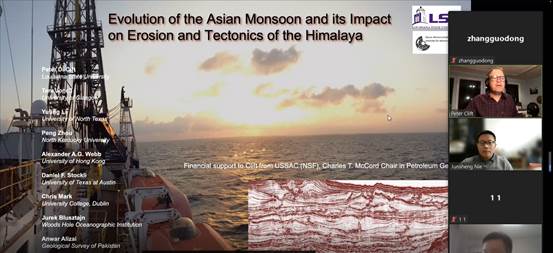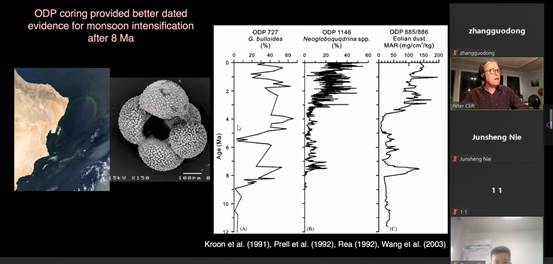On 9 February 2023, at the invitation of Professor Nie Junsheng from the Key Laboratory of Western Environment Ministry of Education, College of Resources and Environment, Lanzhou University, Professor Peter Clift from Louisiana State University gave a lecture on "Evolution of the Asian Monsoon and its Impact on Erosion and Tectonics of the Environment" to our students and faculty. The first online lecture of this series was given by Professor Peter Clift. The lecture was hosted by Professor Nie Junsheng, and was attended by more than 800 faculty members, undergraduates, and postgraduates from Lanzhou University and related universities and research institutes through the online conference and Bilibili lives broadcast.

The coupling relationship between tectonic movement, surface process and climate change is a hot topic in modern earth science. First, Professor Peter Clift dissects the Asian monsoon, linking plateau uplift to monsoon strength and pointing out that the Tibetan Plateau may have a greater influence on the East Asian monsoon, while the Himalayan barrier controls the South Asian monsoon. Second, Professor Peter Clift explores the interaction between tectonic, climatic and surface processes through a variety of terrestrial and Marine borehole records, including isotope analysis, ODP borehole drilling, weathering records, provenances analysis, and photoluminescence, focusing on the monsoon and the Himalayas. Finally, Professor Peter Clift gives a brief summary and outlook on this report. He points out that the Asian monsoon intensification around 24 Ma may be due to the tearing of the Indian plate and the uplifting of the Himalayan topographic barrier. Increased rainfall will intensify the erosion and promote stripping in the Himalayan region; Unlike the early Miocene, it is difficult to relate changes in erosion patterns and rates to monsoon intensity in the late Miocene; It would be helpful to obtain some older sedimentary data on the origin of monsoons and borehole records of some important Asian rivers.

Professor Peter Clift's presentation was very systematic, informative, and enlightening, which opened up the international academic perspective of the teachers and students. After the report, Professor Peter Clift further discussed with Professor Nie Junsheng, Professor Wang Xin and other teachers and students the relationship between monsoon and weathering intensity, the timing of Asian monsoon strengthening and other related issues. Professor Peter Clift's attentive and serious answers to each scholar's questions left a deep impression on the teachers and students attending the academic presentation.
Expert profile:
Professor Peter Clift received his Bachelor's and Master's degrees from Oxford University, and his doctorate from the University of Edinburgh. He is currently the Charles T. McCord Professor of Petroleum Geology at Louisiana State University, USA. His research interests include the stratigraphic development of continental margins, the history of Asian monsoon and its influence on Asian orogeny, the origin of continental crust and the recycling of continental materials through subduction zones. Professor Peter Clift is a Fellow of the Geological Society of America, was Chief Scientist on IODP 355, a Fellow of the Hansel Institute for Advanced Studies, Germany, a Distinguished Lecturer at ECORD, a Distinguished Lecturer at USAC-IODP, a recipient of the Murchison Prize of the Geological Society of London and the Worcester College Award for Excellence, University of Oxford. He has served as a visiting professor at the South China Sea Institute of Oceanology, Nanjing Normal University, Yunnan University, and the University of Hong Kong. So far, Professor Peter Clift has published more than 260 papers in high-level international journals such as Nature, Proceedings of the National Academy of Sciences (PNAS), Nature Geoscience, Nature Communications, Earth-Science Review, Geology and Earth and Planetary Science Letters, and papers have been cited for more than 12,700 times.